Published in Nacional number 673, 2008-10-05
The General's Jewels
The key witnesses that will bring down Zagorec's defence
Nacional reveals national administration plans to use the testimony of close Zagorec aids and friends in the 1990s to clinch a guilty verdict
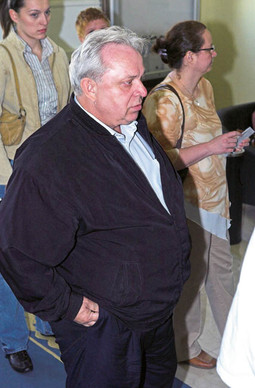 JOSIP FEREK Zagorec's associate will have to explain where the difference in the amount of money he withdrew and that handed over to arms dealers went The State Attorney's Office intends soon to file charges against Vladimir Zagorec, as it wants Zagorec to be convicted as soon as possible for the theft of jewels worth at least 5 million dollars. At the State Attorney's Office they expect that the trial of Vladimir Zagorec could last at most three months, and they hope that he will received a sentence of seven to eight years imprisonment for the crimes he has been charged of.
JOSIP FEREK Zagorec's associate will have to explain where the difference in the amount of money he withdrew and that handed over to arms dealers went The State Attorney's Office intends soon to file charges against Vladimir Zagorec, as it wants Zagorec to be convicted as soon as possible for the theft of jewels worth at least 5 million dollars. At the State Attorney's Office they expect that the trial of Vladimir Zagorec could last at most three months, and they hope that he will received a sentence of seven to eight years imprisonment for the crimes he has been charged of.
Only then could new criminal proceedings be initiated against Vladimir Zagorec, which will, by all accounts, be related to other embezzlements of money earmarked for the arming of Croatia, and which could reveal the secret to Zagorec's wealth, on the basis of which foreign banks backed him with 260 million euros of credit in various construction projects. That is why they are not giving any consideration at the State Attorney's Office of the possible widening of the investigations into Zagorec in that case. The State Attorney's Office is likely to use a small steps tactic, which could already have been discerned in some earlier proceedings in the Zagorec case, and which might lead to some significant discoveries. That is why Zagorec will first be charged with one concrete crime for which convincing evidence and witnesses have been secured. Some of these witnesses, above all Josip Ferek, Zagorec's former immediate subordinate, a man in which he placed his greatest trust, could serve the State Attorney's Office in launching other proceedings.
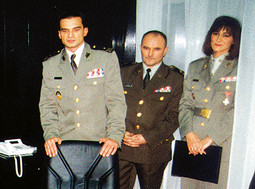 SNJEZANA SIPRAK Zagorec's former secretary at the RH Alan company, has said that she saw two pilot's bags with Rothaichner's jewels Ferek is on the one hand one of the links between Zagorec and domestic banks who used the money of Croatian citizens to pay for the procurement of arms, and on the other hand between Zagorec and Rothaichner, and probably other arms dealers. Ferek was the only witness Zagorec could have, in the opinion of judge Erna Drazancic, influenced during the investigation. That is why Zagorec has been detained to police custody, which has resulted in almost two years of legal wrangling surroundings his extradition to Croatia. Because of the specific position Ferek was in when Croatia was procuring armaments, it is expected that his testimony could serve as a window to other criminal proceedings. Besides, the ongoing proceedings against Zagorec started after Hrvoje Petrac, a former friend and associate of Zagorec's, gave testimony before Zagreb County Court in another case that incriminated Zagorec. These kinds of expectations on the part of the State Attorney's Office are also realistic because it has documentation that reveals that Ferek on several occasions received from Zagorec several million German marks and US dollars in excess of what was stated in the order forms for arms procurements that are linked to the payment of that money.
SNJEZANA SIPRAK Zagorec's former secretary at the RH Alan company, has said that she saw two pilot's bags with Rothaichner's jewels Ferek is on the one hand one of the links between Zagorec and domestic banks who used the money of Croatian citizens to pay for the procurement of arms, and on the other hand between Zagorec and Rothaichner, and probably other arms dealers. Ferek was the only witness Zagorec could have, in the opinion of judge Erna Drazancic, influenced during the investigation. That is why Zagorec has been detained to police custody, which has resulted in almost two years of legal wrangling surroundings his extradition to Croatia. Because of the specific position Ferek was in when Croatia was procuring armaments, it is expected that his testimony could serve as a window to other criminal proceedings. Besides, the ongoing proceedings against Zagorec started after Hrvoje Petrac, a former friend and associate of Zagorec's, gave testimony before Zagreb County Court in another case that incriminated Zagorec. These kinds of expectations on the part of the State Attorney's Office are also realistic because it has documentation that reveals that Ferek on several occasions received from Zagorec several million German marks and US dollars in excess of what was stated in the order forms for arms procurements that are linked to the payment of that money. 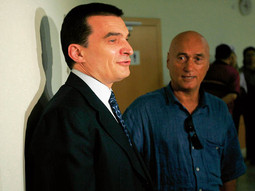 VLADIMIR ZAGOREC with his attorney Hodak, who is trying to defend his client by way of statements to the press That is why the State Attorney's Office expects to hear of Ferek what happened to the rest of that money. If everything was clean, it has to be documented in some fashion. If the money was not embezzled by Zagorec in collaboration with some arms dealer, then suspicion could only fall on Ferek himself. It is not expected that Vladimir Zagorec could, on his own initiative, offer his assistance to the State Attorney's Office in an investigation on how money earmarked for the arming of Croatian was pilfered. Zagorec was a solo player who kept the number of people involved in the procurement of arms as small as possible. If someone was at some moment to link him to an arms dealer, he would subsequently endeavour to take all of the intermediaries out of the loop and conclude the deal himself. He, perhaps, wished to exclude witnesses to possible deals on the commissions from these transactions. Zagorec was probably not the only person who profited from these transactions and he is sure to have excellent insight into who else might have profited. Perhaps that is why he fears for his own security, because he knows he is expected to speak out about these shady deals, and also knows best whether there is any threat of danger to him and what the extent of that danger might be from the people he could name and about whose illicit activities he could personally bear witness to.
VLADIMIR ZAGOREC with his attorney Hodak, who is trying to defend his client by way of statements to the press That is why the State Attorney's Office expects to hear of Ferek what happened to the rest of that money. If everything was clean, it has to be documented in some fashion. If the money was not embezzled by Zagorec in collaboration with some arms dealer, then suspicion could only fall on Ferek himself. It is not expected that Vladimir Zagorec could, on his own initiative, offer his assistance to the State Attorney's Office in an investigation on how money earmarked for the arming of Croatian was pilfered. Zagorec was a solo player who kept the number of people involved in the procurement of arms as small as possible. If someone was at some moment to link him to an arms dealer, he would subsequently endeavour to take all of the intermediaries out of the loop and conclude the deal himself. He, perhaps, wished to exclude witnesses to possible deals on the commissions from these transactions. Zagorec was probably not the only person who profited from these transactions and he is sure to have excellent insight into who else might have profited. Perhaps that is why he fears for his own security, because he knows he is expected to speak out about these shady deals, and also knows best whether there is any threat of danger to him and what the extent of that danger might be from the people he could name and about whose illicit activities he could personally bear witness to.
The State Attorney's Office is aware of this situation and is quite certain to try to use every favourable situation to get Zagorec to really start revealing what he knows about the secrets of Croatia's armament. For a start they will try to prevail upon him to cooperate by a speedy trial and by securing a lengthy prison sentence for the theft of the jewels. Contrary to the claims of Zagorec's attorney Zvonimir Hodak, the State Attorney's Office has plenty of convincing evidence and witnesses that should in court confirm the charges filed against Zagorec that saw him extradited to Croatia a few days ago. Vladimir Zagorec was first linked to the precious stones by his former friend Hrvoje Petrac, when he was on trial for a second time before Zagreb County Court for his role in the kidnapping of Zagorec's underage son Tomislav. Endeavouring to convince the court that he had no motive to kidnap Zagorec's son, Petrac in his testimony spoke of his relationship with Zagorec. Among other things, Petrac asked Zagorec about jewels allegedly worth about 17 million German marks, which Zagorec, according to Petrac's allegations, showed him, stashed in to pilot's bags, to gauge their value and try to sell them. Petrac received the specifications of the precious gems and several samples, but was not successful in his intentions. He later returned the specification and the samples to Zagorec. That took place in the mid 1990s. Zagorec never reported the existence of the jewels to his superiors. When Petrac asked him about the jewels in court, Zagorec said: "I never gave any precious stones and gold in a value of 17 million former German marks to Petrac to have him sell them."
 TEREZIJA BARBARIC The long-time right hand to Jozo Martinovic and later the head of financing at RH Alan, knows much of the movement of money earmarked for arms Zagorec was in February of 2007 proven wrong, among other things, by boxes that had housed the controversial jewels, and which found their way to Nacional. The boxes were delivered to Nacional by a person who claimed that they had previously received them from Zagorec, to try to cash in the precious stones. The contentious jewels were brought to Zagorec at the time by controversial German jeweller Josef Rothaichner as security for one transaction. He was involved in the sale of armaments to Croatia for a time. Rothaichner appeared as a supplier in various armaments transactions, and as security for the return of a part of the money for armament brought the contentious jewels to Croatia. It is not known what happened with the jewels, but it is completely certain that Zagorec kept them in his office safe to the last day until his departure, after the elections of 3 January 2000. And while Zagorec insists that he did not give the precious stones to Petrac to resell, Petrac is the witness who can connect the jewels to Zagorec, and possibly to recognise whether they were the same boxes given to him by Zagorec. Only a few days after the information was announced on the existence of these boxes, the State Attorney's Office launched proceedings against Vladimir Zagorec. The cited boxes will appear as evidence at the trail of Zagorec.
TEREZIJA BARBARIC The long-time right hand to Jozo Martinovic and later the head of financing at RH Alan, knows much of the movement of money earmarked for arms Zagorec was in February of 2007 proven wrong, among other things, by boxes that had housed the controversial jewels, and which found their way to Nacional. The boxes were delivered to Nacional by a person who claimed that they had previously received them from Zagorec, to try to cash in the precious stones. The contentious jewels were brought to Zagorec at the time by controversial German jeweller Josef Rothaichner as security for one transaction. He was involved in the sale of armaments to Croatia for a time. Rothaichner appeared as a supplier in various armaments transactions, and as security for the return of a part of the money for armament brought the contentious jewels to Croatia. It is not known what happened with the jewels, but it is completely certain that Zagorec kept them in his office safe to the last day until his departure, after the elections of 3 January 2000. And while Zagorec insists that he did not give the precious stones to Petrac to resell, Petrac is the witness who can connect the jewels to Zagorec, and possibly to recognise whether they were the same boxes given to him by Zagorec. Only a few days after the information was announced on the existence of these boxes, the State Attorney's Office launched proceedings against Vladimir Zagorec. The cited boxes will appear as evidence at the trail of Zagorec.
Petrac is to be only one of the witnesses that will give testimony on the contentious jewels. And while it was on the basis of his testimony that the State Attorney's Office launched the criminal persecution of Vladimir Zagorec, it will be interesting to see how Petrac will behave at the trial. Why would Petrac implicate Zagorec at his trial and so assist the state that has, in his opinion, wrongfully convicted him for the kidnapping of Zagorec's son? And that was not enough, so he subsequently received an additional prison sentence for the alleged extortion of Miroslav Matkun in the re-trial in which he was initially acquitted. The state's crowning injustice towards him was the recent acquittal of Drago Regvart of charges that he defrauded Petrac when he first, in November of 2002, sold him a house on Pantovcak street no. 82 for 350 thousand marks, and a month later to another buyer. It is interesting that the house is in the direct vicinity of Prime Minister Sanader's home.
Besides Petrac, there are other witnesses that should testify in court that Zagorec misappropriated the contentious jewels. The witness who has so far most convincingly implicated Zagorec was his former secretary Snjezana Siprak. She said that she saw Rothaichner leave Zagorec two pilot's bags with jewels, that Zagorec stored them in his office safe and took when leaving the post.
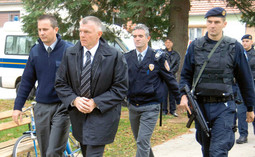 HRVOJE PETRAC Being brought in for the re-trial in which he was, after being acquitted, convicted in the Matkun case; it is an open question how much motivation he will have to help the state convict Zagorec Vladimir Zagorec's attorneys where not overly particular in choosing the methods by which they tried to cast doubts on the prosecution's key witnesses. They began insinuating to journalists that Hrvoje Petrac and Snjezana Siprak were lovers, and subsequently claimed that Petrac had bought her a café in Zagreb. They soon wound up appearing comic, as Nacional came into possession of contracts that showed that Zagorec and his attorneys were lying in an effort to cast aspersions on the testimony given by Petrac and Snjezana Siprak at Zagreb County Court.
HRVOJE PETRAC Being brought in for the re-trial in which he was, after being acquitted, convicted in the Matkun case; it is an open question how much motivation he will have to help the state convict Zagorec Vladimir Zagorec's attorneys where not overly particular in choosing the methods by which they tried to cast doubts on the prosecution's key witnesses. They began insinuating to journalists that Hrvoje Petrac and Snjezana Siprak were lovers, and subsequently claimed that Petrac had bought her a café in Zagreb. They soon wound up appearing comic, as Nacional came into possession of contracts that showed that Zagorec and his attorneys were lying in an effort to cast aspersions on the testimony given by Petrac and Snjezana Siprak at Zagreb County Court.
Terezija Barbaric will be another important prosecution witness at the trial of Zagorec. In the 1990s she worked at the Privredna banka Zagreb (PBZ), and as chief of staff to finance minister Jozo Martinovic. She also served in an advisory role to Martinovic's sucessors at the post, and at the same time was head of finances at RH Alan at the time the company had a monopoly in transactions involving the armament of Croatia, and which was headed by Zagorec. She was the chief person through which payments abroad were made. It is estimated that she made payments abroad of almost 2 billion dollars. There is no return documentation for the lion's share of these transactions.
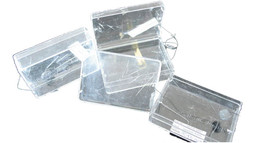 THE BOXES the housed the jewels: one piece of material evidence against Zagorec In an interview for Nacional, Terezija Barbaric thus described how Zagorec did business at the time: "I would get a piece of paper, or I would get a call from Zagorec or from Snjezana Siprak, his secretary. They would sometimes even send an order on my pager… There is documentation on which it can be seen that I am signed on orders to pay cash out to Zagorec. I was sitting at Katicic's, and would give an order to our vault to pay to him a certain sum of money. Cash was paid out to him by the manager of the PBZ bank's branch in Racki street no. 6. What he did with the money – is not known for sure… In some cases the cash was picked up by some of Zagorec's people – for example his man would come in, pick up "small change" of 500,000 euro, and leave." Terezija Barbaric has stated that as head of financing at RH Alan she never received return documentation that clearly showed how the money had been spent.
THE BOXES the housed the jewels: one piece of material evidence against Zagorec In an interview for Nacional, Terezija Barbaric thus described how Zagorec did business at the time: "I would get a piece of paper, or I would get a call from Zagorec or from Snjezana Siprak, his secretary. They would sometimes even send an order on my pager… There is documentation on which it can be seen that I am signed on orders to pay cash out to Zagorec. I was sitting at Katicic's, and would give an order to our vault to pay to him a certain sum of money. Cash was paid out to him by the manager of the PBZ bank's branch in Racki street no. 6. What he did with the money – is not known for sure… In some cases the cash was picked up by some of Zagorec's people – for example his man would come in, pick up "small change" of 500,000 euro, and leave." Terezija Barbaric has stated that as head of financing at RH Alan she never received return documentation that clearly showed how the money had been spent.
 JOSEF ROTHAICHNER testified about Zagorec before Zagreb County Court: it is an open question as to whether he protected Zagorec because of private relationships Documents from the period reveal that Josip Ferek, Zagorec close associate at the time, on 8 October of 1993, received 1,500,000 dollars from Terezija Barbaric at the Ministry of Finance. He gave the money to Zagorec, who passed it on that same day to Rothaichner. On 25 October of 1993 Ferek received 3 million dollars in cash from the PBZ bank vault, on Jozo Martinovic's orders. That same day he gave the money to Zagorec, who gave it to Rothaichner. The Ferek on 29 October of 1993 again received from Terezija Barbaric a million dollars in cash, gave it to Zagorec, who passed it on that same day to Rothaichner. From this it turns out that Rothaichner received 5,500,000 dollars from Zagorec in that period, which is 1,104,400 dollars above the value of the goods ordered at the time by Gojko Susak and for which payment was approved by him. A similar scenario occurred in a number of other cases. In his defence Zagorec is counting most on Josef Rothaichner. In September of 2007 he appeared in Zagreb and, in the company of Zagorec's attorney Zvonimir Hodak gave more than two hours of testimony before County Court. He then immediatelty made his way to Zagreb Airport and left Croatia. Zagorec's attorney Zvonimir Hodak said then that Rothaichner had in a part of his testimony reiterated what he had already told the District Court in Vienna in late June of 2007. There he testified on 27 June 2007 that he never gave Vladimir Zagorec any kind of bag containing jewels, which was t have served as security for 5 million dollars the defence ministry had given him for the procurement of the S300 missile system. Technically, it is truly possible that Rothaichner did not in fact give Zagorec the jewels for the procurement of the S300 missile system, as the real suppliers of those weapons at the time had distanced themselves from Rothaichner. However, by all accounts, Zagorec did receive the jewels from Rothaichner, but in the context of another arms procurement collaboration. And that was not asked of him in court and he cannot, therefore, be convicted of lying under oath. He namely, spoke the truth, that he did not give any jewels as security for the S300 system, because it was security for another delivery.
JOSEF ROTHAICHNER testified about Zagorec before Zagreb County Court: it is an open question as to whether he protected Zagorec because of private relationships Documents from the period reveal that Josip Ferek, Zagorec close associate at the time, on 8 October of 1993, received 1,500,000 dollars from Terezija Barbaric at the Ministry of Finance. He gave the money to Zagorec, who passed it on that same day to Rothaichner. On 25 October of 1993 Ferek received 3 million dollars in cash from the PBZ bank vault, on Jozo Martinovic's orders. That same day he gave the money to Zagorec, who gave it to Rothaichner. The Ferek on 29 October of 1993 again received from Terezija Barbaric a million dollars in cash, gave it to Zagorec, who passed it on that same day to Rothaichner. From this it turns out that Rothaichner received 5,500,000 dollars from Zagorec in that period, which is 1,104,400 dollars above the value of the goods ordered at the time by Gojko Susak and for which payment was approved by him. A similar scenario occurred in a number of other cases. In his defence Zagorec is counting most on Josef Rothaichner. In September of 2007 he appeared in Zagreb and, in the company of Zagorec's attorney Zvonimir Hodak gave more than two hours of testimony before County Court. He then immediatelty made his way to Zagreb Airport and left Croatia. Zagorec's attorney Zvonimir Hodak said then that Rothaichner had in a part of his testimony reiterated what he had already told the District Court in Vienna in late June of 2007. There he testified on 27 June 2007 that he never gave Vladimir Zagorec any kind of bag containing jewels, which was t have served as security for 5 million dollars the defence ministry had given him for the procurement of the S300 missile system. Technically, it is truly possible that Rothaichner did not in fact give Zagorec the jewels for the procurement of the S300 missile system, as the real suppliers of those weapons at the time had distanced themselves from Rothaichner. However, by all accounts, Zagorec did receive the jewels from Rothaichner, but in the context of another arms procurement collaboration. And that was not asked of him in court and he cannot, therefore, be convicted of lying under oath. He namely, spoke the truth, that he did not give any jewels as security for the S300 system, because it was security for another delivery.
In 2007 Zagorec and Rothaichner were at the famed Vienna Opernball. That circumstance sheds new light on Rothaichner's role in the Zagorec case, as it shows that they are privately close and that Rothaichner may have had reason to lie in the jewels affair to protect his friend. In the company of Zagorec and Rothaichner that evening were bankers who are looking after Zagorec's money in Lichtenstein and Luxembourg. Zagorec is alleged to have covered the cost of all their tickets himself. It all opens a wide field of serious doubts that Rothaichner, for personal reasons, concealed the truth in court and by doing so protected Zagorec. It also shows how out of place and trivial the recent statements made by Zagorec's attorney Hodak are to the effect that the charges against Zagorec are purely fictional.
On the media offensive
The Zagorec case –Criminal charges for falsifying a contract
Besides the trial for the diamonds, Vladimir Zagorec will face other court proceedings in Croatia, in which he stands to lose a significant part of the great wealth he has gained in a very dubious fashion. Nacional in November of 2007 came into possession of documents that show that the 44-year-old retired general registered himself as the owner of an entire building in downtown Zagreb using shoddy forgeries and conning Vesna Grivicic-Zanic, a helpless 79-year-old Croatian citizen who has lived for decades in Caracas, Venezuela. By way of her Zagreb attorneys she filed on 29 September of this year charged against Zagorec for the forging of official documents and the misappropriation of valuable real estate she received in the denationalisation procedure, and a lawsuit that should render void all contracts whereby Zagorec secured the entire building on Ilica Street no. 10, in the very heart of downtown Zagreb, the value of which is estimated at millions of kuna.
If one takes into consideration that the market value of a square metre in the heart of downtown Zagreb costs about 5 thousand euro, it turns out that Zagorec earned in excess of 2 million euro in the swindle. Since there are indications that Zagorec was assisted in the con job by several people from state institutions, who registered the illegally acquired real estate without verification, the investigation that should soon be launched by the State Attorney's Office will probably be in that direction. According to the reconstruction, the swindle itself was carried out in a very banal manner: Zagorec contacted the aging heiress, agreed with her on the sale of the dilapidated loft, and then used her signature for a forgery whereby he came into premises of 500 square metres in downtown Zagreb. To make the entire case even more bizarre, he secured the registration of property rights to himself, by way of deeds of benefaction, whereby it turned out that Vesna Grivicic-Zanic had decided, without compensation, to bestow her inheritance to Zagorec. Vesna Grivicic-Zanic is the daughter of Leonard Grivicic, who lived in the 1940s in the big building at Ilica no. 10 where he had a textile store, and was the owner of a textile factory. After the fall of the World War II Croatian state the family departed for Venezuela.
As soon as Croatia regained its independence Vesna Grivicic requested and was granted Croatian citizenship, and when, in 1996, the so-called de-nationalisation bill was passed in Croatia, she gave her attorneys in Zagreb power of attorney to represent her in the restitution of property. They were very successful in doing so – by 1999 they had succeeded in securing the restitution of most of the real estate that had once been owned by her father. Since she did not intend to return to Croatia, she decided to sell most of the real estate that was returned to her, and in 2002 sold several floors of the building on Ilica street no. 10.
A first floor flat and office space in the loft, however, remained unsold. And it appears that in mid-2003 Zagorec took an interest in the premises. He then contacted the Croatian General Consul in Caracas, Zdravko Sancevic, who put Zagorec and Vesna Grivicic-Zanic in contact in the summer of 2003. Zagorec then asked her to sell him a small office in the loft of the building on Ilica street no. 10. He claimed that the office space in question was dilapidated and convinced her to sell it to him for only 220 US dollars. The story of the Ilica no. 10 building would have ended there had Vesna Grivicic-Zanic not decided last year to sell the remaining premises in the building, but discovered then that Vladimir Zagorec was, in the meantime, entered in the land registry as the owner of a large office in the building's loft and a flat on the first storey. And he did so, as is indicated by the documents Nacional has possession of, by drawing up two deeds of benefaction, that are in fact, common forgeries.
Related articles
Four countries investigate crime at Hypo bank
An important international meeting of representatives from the state prosecutor's offices of Austria, Germany, Liechtenstein and Croatia, was held at… Više
Latest news
-
28.10.2010. / 14:15
'A profitable INA is in everyone's interest'
-
28.10.2010. / 09:38
Sanader’s eight fear SDP — Won’t bring down Government
-
21.10.2010. / 15:02
Interior Ministry turned a blind eye on Pukanic assassination
-
20.10.2010. / 09:34
Barisic could bankrupt HDZ




